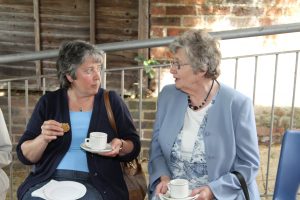 Lockdown is slowly ending, and we are seeing pictures of people having picnics in the sun, going for walks, and sitting on the grass in parks. Life is opening up and we are all looking forward to meeting together again. But to my surprise Rosie (name changed), an older lady I meet over Zoom, said that even though lockdown was lifting she planned to stay at home. She was still nervous about the coronavirus, which isn’t surprising considering the fearsome press stories and pictures over the last year, but that wasn’t the real reason. She has become very comfortable just being at home and not going out – not even to church, which she can watch online.
Lockdown is slowly ending, and we are seeing pictures of people having picnics in the sun, going for walks, and sitting on the grass in parks. Life is opening up and we are all looking forward to meeting together again. But to my surprise Rosie (name changed), an older lady I meet over Zoom, said that even though lockdown was lifting she planned to stay at home. She was still nervous about the coronavirus, which isn’t surprising considering the fearsome press stories and pictures over the last year, but that wasn’t the real reason. She has become very comfortable just being at home and not going out – not even to church, which she can watch online.
Thousands of older people feel the same. They are comfortable, they have their groceries and medications delivered, neighbours will usually pop in from time to time, (a habit strengthened in lockdown), they can watch television and like my friend, hold conversations over Zoom. Also, interacting with others takes energy, something many feel is lacking. Where an extrovert personality is energised by being with other people, an introvert feels drained. At her first out-of-lockdown meeting a friend said she was buzzing and bouncing off the walls, whereas Rosie would be prone on the sofa.
But if Covid has shown us anything at all, it’s that we need interactions with one another. Sociologists say it’s because we are a social species, but it’s more than that. It’s how God has made us, in His own image. He is the Trinity; the Father, the Son, and the Holy Spirit – the epitome of relationship. We are ‘God’s masterpiece’ says Ephesians 2:10 – we are designed for relationship. It’s what life is all about. Catherine Loveday, Professor of cognitive neuroscience at the University of Westminster says, ‘Our brains wake up in the presence of other people.”[i]
Isolation during lockdown has caused a kind of brain fog, says psychoanalyst Josh Cohen. We’ have lived through a ‘contraction of life, and an almost parallel contraction of mental capacity,’ he said. It has caused “poor cognitive function and duller thinking.”’[ii] In older adults, where there’s been a degree of neurological decline, it will be accelerated.
Sadly, that’s what has happened with an older couple close to me. The husband, Dave, (name changed) takes medication for a cardiovascular condition, and over the past few years has been like a clock running down, becoming slower in his moving and thinking. A retired pastor, he’d spent his whole working life preaching, pastoring, running children’s holiday clubs and so on. To use an old expression, Dave is a ‘people person’. But during lockdown his decline was fast: now he has been diagnosed with dementia. His wife is convinced that the lack of stimulus from other people has been a major accelerator.
A recent study by UCL (University College London) published in Ageing Research Reviews, suggests that social isolation could be a greater risk factor for dementia than previously believed. Socialising is good for us – one of the reasons GPs have been instructed to do ‘social prescribing.’
Especially good for us are our church fellowship meetings. I’m sure God had this in mind when He inspired the writer of the letter to the Hebrew believers ‘not to neglect the assembling of ourselves together’ (Hebrews 10:25). Several studies show that when we regularly attend a place of worship we are less stressed, in general healthier and tend to live longer than those who don’t attend. One professor was so impressed he said he was considering going to church, even though he was an atheist.
If being nervous about infection keeps you at home, remember that most of us have been inoculated and cases of Covid have dropped dramatically. The vaccines are working well even with the variants that pop up. Think how the inoculations of the past have eradicated dreadful diseases. Smallpox, leprosy, tuberculosis, polio, and more been defeated – and so it is with Covid. So don’t let fear defeat you. Try little trips at first, perhaps to the corner shop, instead of the supermarket.
‘Just as the mountains surround Jerusalem, so the LORD surrounds His people, both now and forever.’ Psalm 125:2. A promise that He will be all around you. So don’t worry – just go!
[i] https://www.theguardian.com/lifeandstyle/2021/apr/14/brain-fog-how-trauma-uncertainty-and-isolation-have-affected-our-minds-and-memory [ii] https://www.theguardian.com/lifeandstyle/2021/apr/14/brain-fog-how-trauma-uncertainty-and-isolation-have-affected-our-minds-and-memory














